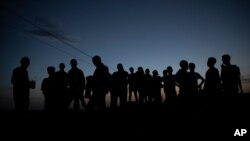As the conflict in northern Ethiopia’s Tigray region enters its sixth month, the U.N. Security Council broke its silence Thursday to call for scaled-up humanitarian access and “a restoration of normalcy.”
The statement from the 15-nation council also expressed “deep concern” about reports of sexual and gender-based violence against women and girls in Tigray, calling for investigations and accountability, but did not directly condemn them.
Disturbing and horrifying reports have emerged from survivors coming out of Tigray of being raped and gang-raped by men, mostly in uniforms. A senior U.N. official said this week that it may be many months before the full scale and magnitude of atrocities being committed against women and girls in Tigray is known.
Council members also reiterated their strong support for regional mediation efforts, particularly the African Union and IGAD, and underscored the importance of their continued engagement.
Ireland led the negotiations to achieve the consensus statement. Since assuming a two-year rotating council seat in January, Ireland has convened two informal meetings on Tigray, as Ethiopia is not formally on the council’s agenda.
At an event on Wednesday at Georgetown University, Ireland’s U.N. envoy Geraldine Byrne Nason said the council’s silence on Tigray had been “deafening” and was not helping the situation. She struck a more positive note on Thursday.
“For the first time, this council speaks with one voice to express its collective concern about the dire humanitarian situation on the ground,” she said in a statement. “While acknowledging the initial steps taken by the Ethiopian government, the Security Council today recognizes that humanitarian actors on the ground need nothing less than unfettered access to people in need.”
The region, in Ethiopia’s north, has been the epicenter of hostilities since November, when fighters from the Tigray People’s Liberation Front (TPLF) attacked army bases in the region, according to the federal government. The attack prompted the government to launch a military offensive to push the group out, Ethiopian Prime Minister Abiy Ahmed said.
Ethiopia’s U.N. Mission responded to the Security Council, posting a statement on Twitter.
“The Mission wishes to underscore that the law enforcement operation in Ethiopia is an internal affair regulated by the laws of the country, including human rights laws,” the statement said. “The operation undertaken to restore law and order in the Tigray region is within the sovereign purview of the state.”
The government reiterated its commitment to investigate and ensure accountability for human rights violations, including sexual violence. It also said it is providing a “significant portion” of humanitarian assistance and urged the international community to scale up assistance to satisfy needs in Tigray and beyond.
The Tigray interim administration estimates that at least 4.5 million of Tigray’s nearly 6 million people need humanitarian assistance. The United Nations has appealed for $1.5 billion to assist 16 million people in Tigray and across Ethiopia this year.




